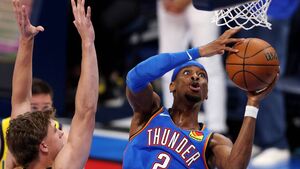Another reminder that you don’t build a dynasty on noise

Shai Gilgeous-Alexander of the Oklahoma City Thunder attempts a layup against the Indiana Pacers during the fourth quarter in Game Two of the 2025 NBA Finals at Paycom Center. Picture: William Purnell/Getty Images)
From thousands of miles away, Oklahoma City doesn’t seem like the kind of place that could shape the future of basketball. It doesn’t have the glamour of Los Angeles or the history of New York. It’s a small city in a big league. And yet, in this unlikely corner of the American map, a basketball empire was built.
This was supposed to be the forgotten franchise, the team that got left behind.
Kevin Durant packed his bags for California. James Harden hit the high road before his beard had evolved into legend. Russell Westbrook stayed longest as the city's loyal soldier until he, too, was gone. The house was emptied. The lights were off. The windows were shuttered.
In most places, that would’ve been the end of the story. A short chapter. An afterthought in the footnotes. But Oklahoma clearly isn’t most places.
Where other fan bases might have reached for the torches, this one simply stayed. They turned up and waited. Not with the anger of the betrayed but with the weary patience of people who know the bus might be late, but that it’s coming all the same.
And somewhere along the way – through the fog of draft picks and defeats and names nobody yet knew how to pronounce – something took root again. Quietly – and without the fuss and ceremony of a rebirth – a new team emerged. The new team wasn't loud. But it would be better.
The franchise peaked last week when they beat the Indiana Pacers in Game 7 of the NBA Finals – not with a last-second miracle from half-court, but with the kind of poise that doesn’t come from luck. It comes from belief and hard work.
Oklahoma City Thunder weren’t supposed to win a title. They were supposed to be grateful just to exist. A geographic inconvenience in a league built on beach fronts and lucrative broadcast markets. In footballing terms, it’s as if Burnley or Bologna had risen through the ranks, losing star after star, and yet found themselves lifting the Champions League by sheer force of obstinacy.
In the age of the superteam, Sam Presti did something almost impolite: he took his time. While the rest of the league played speed chess with salary caps and star alliances, Oklahoma City’s general manager sat with his draft board and a long-term plan that often looked like madness. He wasn't building a team. He was cultivating one.
Over time, the war chest of draft picks grew so vast that it felt less like a rebuild and more like a hedge fund. Presti didn’t chase headlines. He didn’t swing just to show he still had a bat. What he did slowly and deliberately was construct a culture that valued coherence over chaos, character over charisma.
There were no shortcuts. No flashbulb signings. No vanity trades designed to sell jerseys or fill airtime on radio chat shows. It was as if Oklahoma City were trying to prove that you could still win in the modern NBA by doing things the old-fashioned way – with patience, planning and a point guard who remembers how to pass.
In a different sport and on a different continent, they’d be called a selling club, the type of team that raises talent only to watch it bloom elsewhere. But Presti didn’t raise players to sell them. He raised them to stay, to fit into the system, to build something that would last longer than a news cycle.
And now, with a Larry O’Brien trophy sitting quietly in their front office, it’s clear that he wasn’t hoarding picks. He was laying bricks. It takes a rare kind of conviction to build a basketball team like a cathedral – slowly, over years, with no guarantee of ever seeing it finished. But that’s what he did. And now it stands high, defiant and lit from within.
If you were building a leader for Oklahoma City in a lab, you'd create a player that doesn't bark or posture or seek to declare himself as the best player on the court. He'd just make it obvious, one unhurried possession at a time. In a league addicted to noise, Shai Gilgeous-Alexander is a still beacon in the storm, a superstar who leads not with volume but with gravity. The game slows when it's in his hands, as if even the shot clock pauses out of respect.
There’s something in his game – the slow steps, the sudden bursts, the refusal to be rushed – that feels almost philosophical. It's like time bends for him. He plays as if the shot clock is a suggestion, not a deadline.
It’s no accident he leads this team. This Thunder team isn’t built to dazzle you into submission. It’s built to out-think and outlast you. The side has an array of other great players but it all flows from their main man. His calm is contagious. His style is just a little mischievous. He makes being unbothered look like a superpower.
You don’t build a dynasty on noise. You build it on trust, on timing, on a man who knows the difference between being noticed and being remembered.
In European football, there are clubs that dream. And then there are clubs that spend. Most of the time, they are not the same thing. That's why this title, won not by accident but by architecture, lands with a sort of quiet force. It is not just a story of victory; there is a sense of vindication to the triumph. This is a team that refused to hurry, a front office that resisted panic, a fanbase that stayed when it would’ve been easier to drift.
This wasn’t a title brokered in boardrooms or backchannels. It was grown, patiently and stubbornly.
They didn’t blitz the league. They absorbed it, out-thought it and played like a team that knew you can’t sprint to something that was never meant to be rushed.
In an age obsessed with acceleration, immediate returns and instant relevance, there’s still something beautiful in the slow build and trusting the foundation.
Oklahoma City Thunder didn’t just win. They showed that it’s still possible to win this way. No shortcuts. No declarations. Just a deep and durable belief that if you build it right, it will last.
And maybe that’s the most radical idea in sport today.




